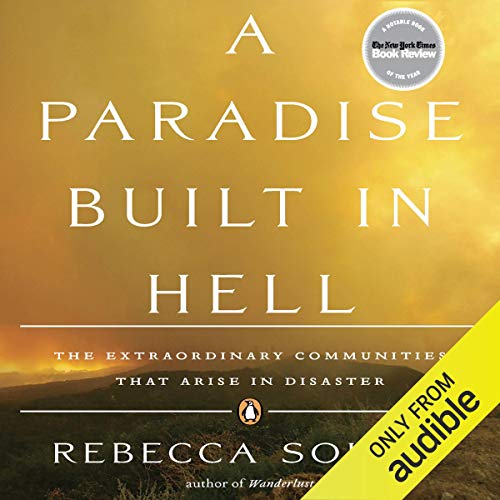
A Paradise Built in Hell
The Extraordinary Communities That Arise in Disaster
Failed to add items
Add to basket failed.
Add to wishlist failed.
Remove from wishlist failed.
Adding to library failed
Follow podcast failed
Unfollow podcast failed
3 months free
Buy Now for £18.99
No valid payment method on file.
We are sorry. We are not allowed to sell this product with the selected payment method
-
Narrated by:
-
Emily Beresford
-
By:
-
Rebecca Solnit
About this listen
The most startling thing about disasters, according to award-winning author Rebecca Solnit, is not merely that so many people rise to the occasion, but that they do so with joy. That joy reveals an ordinarily unmet yearning for community, purposefulness, and meaningful work that disaster often provides. A Paradise Built in Hell is an investigation of the moments of altruism, resourcefulness, and generosity that arise amid disaster's grief and disruption and considers their implications for everyday life. It points to a new vision of what society could become - one that is less authoritarian and fearful, more collaborative and local.
©2009 Rebecca Solnit (P)2014 Audible Inc.Critic reviews
The book eloquently explains how for the elite and those in charge protecting property is often what is most important in a crisis, whereas ordinary people seek to save each other.
Well worth a listen
Community not bureaucracy
Something went wrong. Please try again in a few minutes.
What was one of the most memorable moments of A Paradise Built in Hell?
The descriptions of the aftermath of Katrina were shocking to a non-American and something I was surprised to hear. The basic failures of the government during this time was something that I was aware of but the details were grisly and something I won't forget, and nor should I.Was there a moment in the book that particularly moved you?
The entirety of the book was filled with moving encounters of underrepresented examples of humans at their best in the worst possible scenarios. I certainly recommend it to those who have lost their faith in the people of the modern world.Similar to Shock Doctrine but from another angle
Something went wrong. Please try again in a few minutes.
Great book, accents were a bit much.
Something went wrong. Please try again in a few minutes.
Awful narration
Something went wrong. Please try again in a few minutes.
The narrator’s performance is dull too.
Boring. Too American.
Something went wrong. Please try again in a few minutes.



















